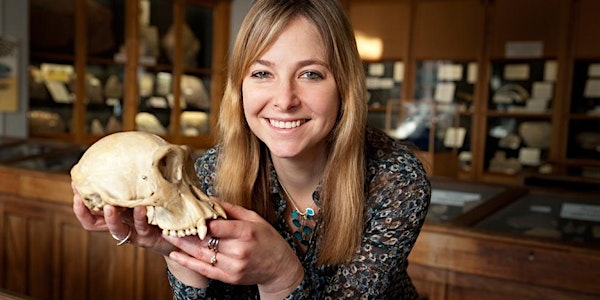
Professor Alice Roberts Seminar - The Modern Prometheus
Date and time
Location
Lecture Theatre 2, B Floor
University of Sheffield Medical School Beech Hill Road Sheffield S10 2RX United KingdomDescription
Professor Alice Roberts a clinical anatomist and Professor of Public Engagement in Science at the University of Birmingham. She is also well known as a broadcaster and science presenter on TV programmes including The Incredible Human Journey, Origins of Us, Prehistoric Autopsy, Ice Age Giants, Time Team and Horizon. She occasionally presents Inside Science on Radio 4. Alongside academic duties Alice is passionate about inspiring people about science.
The Modern Prometheus - Let me suggest an image to you: the image of the ‘mad scientist’.
Suddenly, he (and it is always ‘he’) springs to mind, complete with crazy, white hair; inevitably in a white coat; gripping a test tube of bubbling or steaming liquid, or pulling levers on a machine which generates sparks of electricity; muttering to himself or cackling about some undoubtedly fiendish scheme that he‘s devised.
Who on earth is this person? Well, my mad scientist – and he might be similar to yours – looks like an amalgam of Einstein, Doc Brown from Back to the Future, and maybe even a bit of Professor Heinz Wolff. As for his personality and intentions, he’s a driven, single-minded, possibly even villainous man, pursuing an esoteric vision, with disregard for the consequences of his actions and disdain for humanity. It’s easy to blame Mary Shelley for this archetype: after all, she created Frankenstein (not the monster; the scientist who made him). But, in Frankenstein, did she create an unhelpful stereotype which personified and perhaps encouraged public distrust in science? I don’t believe she did.
Mary Shelley’s novel has been variously critiqued as a book about politics, feminism, atheism and the dangers of science. There are certainly many layers to the book, in the way it’s constructed like a Russian doll, with stories within stories; but also in its layers of meanings. One of the themes in the book appears on the face of it to be anti-science, but I think it’s much more nuanced. Rather than warning us about the dangers of science itself, Mary Shelley is critiquing the idea of a solitary genius: someone who isolates himself from the rest of society and obsessively pursues his own vision. I think that Frankenstein certainly has something to say about science and society, but rather than a simple admonition, this is a story about how science is carried out, and the danger of separating science from society.
English physical chemist and novelist C P Snow picked up this theme in his famous 1959 Rede Lecture at Cambridge University, on The Two Cultures and the Scientific Revolution. He argued that western society had become polarised, between two, mutually uncomprehending groups: literary intellectuals and scientists. He wasn’t worried about science running amok, but instead suggested that the potential for science to improve lives would be significantly curtailed unless the importance of science and scientists was more broadly recognised by society. Snow wasn’t the first to identify such a cultural divide; the biologist T H Huxley had expressed similar concerns in his book, Science and Education, published in 1902, and historians have traced the cultural divide between arts and sciences back to the Renaissance.
There’s no doubt that science is a powerful provider of knowledge, and that the technology which flows from scientific knowledge has the potential to transform lives for the better. But, more than a century since Huxley penned his thoughts on science and education, and more than 50 years since C P Snow’s Rede Lecture, we still seem to be wrestling with the place of science in society.
Critics of the ‘Two Cultures’ concept have argued that there is no real divide: that the arts and sciences exist at opposite ends of a continuum. Yet science still seems to exist in a ghetto, away from the rest of culture. Popular stereotypes like the ‘mad scientist’ may not help, but scientists themselves can be strangely keen to mark out their separation from the rest of society. I’m worried by recent campaigns to reclaim words like ‘geek’ and ‘nerd’. These words are hard to separate from their pejorative overtones; they are still labels which emphasise a division between scientists and non-scientists; and they convey a very narrow image of a ‘scientist’.
I’d like us to move beyond stereotypes and for society to embrace science – but I’m not arguing for blind trust in science and scientists. Science can be a powerful force for good, but in order to realise that potential and to be trusted, it has to be subject to social scrutiny. Scientists should recognise the social implications of their work, communicate with the wider public, and be open to criticism. That, I think, is the moral at the heart of Mary Shelley’s novel. If Victor Frankenstein had stopped to think about – to talk about – what he was doing, he would never have created the Monster.